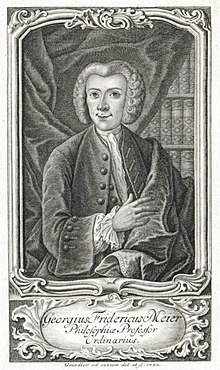
Back جورج فريدريك ماير Arabic جورج فريدريك ماير ARZ Georg Friedrich Meier (Philosoph) German Georg Friedrich Meier Spanish Georg Friedrich Meier Italian
Georg Friedrich Meier | |
|---|---|
 | |
| Born | 26 March 1718 |
| Died | 21 June 1777 (aged 59) |
| Education | University of Halle |
| Era | 18th-century philosophy |
| Region | Western philosophy |
| School | Age of Enlightenment |
| Institutions | University of Halle |
| Academic advisors | A. G. Baumgarten |
Main interests | Aesthetics |
Preview warning: Page using Template:Infobox philosopher with unknown parameter "influences"
Preview warning: Page using Template:Infobox philosopher with unknown parameter "influenced"
Georg Friedrich Meier (26 March 1718 – 21 June 1777) was a German philosopher and aesthetician.[2] A follower of Alexander Gottlieb Baumgarten, he reformed the philosophy of Christian Wolff by introducing elements of John Locke's empiricist theory of knowledge.[3]
- ^ Gary Banham, Dennis Schulting, Nigel Hems (eds.), The Continuum Companion to Kant, Continuum, 2012, p. 136.
- ^ Rydberg, Andreas (2023). "Tempering the Marital Mind: Civic Regimens of Love and Marriage in German Mid-Eighteenth-Century Moral Weeklies". Modern Intellectual History. doi:10.1017/S1479244323000185. ISSN 1479-2443.
- ^ Thiel, Udo (2006), "Meier, Georg Friedrich", in Haakonssen, Knud (ed.), The Cambridge History of Eighteenth-Century Philosophy, vol. 2, Cambridge University Press, pp. 1202–3.
© MMXXIII Rich X Search. We shall prevail. All rights reserved. Rich X Search